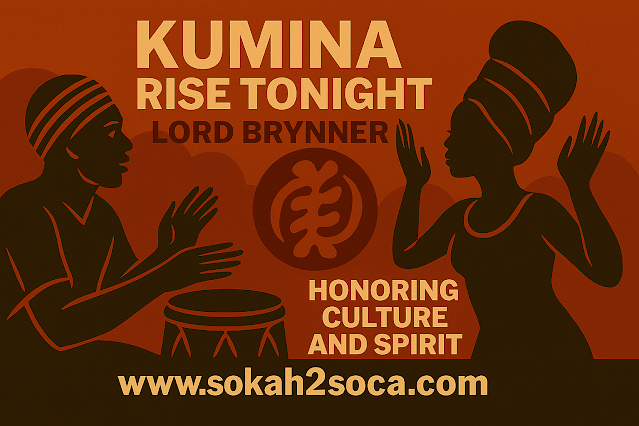When Lord Brynner sang “Kumina Rise Tonight,” he wasn’t just invoking rhythm—he was summoning memorable African ancestral practices. Memories dance through the bones, drum through the blood, and serve as a constant reminder that our culture is sacred, not merely a show. At Sokah2Soca, we honor that heartbeat. From Calypso’s conscience to Kumina’s ancestral fire, our mission is simple: amplify the sounds that carry history—and keep them rising. This practice exists in various forms across the Caribbean, known by different names, but ultimately it involves invoking and communicating with ancestral spirits through drums, dancing, and traditional African call-and-response singing.
Now let's dig into the invocation; let's discover the secrets behind “Kumina Rise Tonight.” This message indicates that a Kumina ceremony is about to take place. As you can tell after listening to the song, it is a powerful cultural invocation that draws on the Afro-Jamaican spiritual tradition of Kumina—a ritual practice rooted in Central African (primarily the Congo region) heritage. Obviously one can see the impact of the island's slave ancestry. The slave masters were unaware of the culture these enslaved people brought with them or simply did not see it as something worthy of consideration. They successfully Christianized the slaves, but some clung to their ancestral gifts and spirits. Kumina ceremonies in Jamaica involve a combination of cultural practices and the religious traditions of the Congo people. Brynner sings about a community of people gathering in the dark to celebrate Kumina. Kumina ceremonies involve drumming, dancing, and spirit possession and are often held to honor ancestors or seek guidance and protection.
So what was Brynner's goal when he sang "Kumina Rise Tonight?" In this calypso, he likely uses the phrase “Kumina rise tonight” as both a literal and symbolic call to awaken ancestral power and cultural memory. It’s a celebration of African spiritual resilience and a reminder that beneath the surface of Caribbean festivity lies a deep well of sacred tradition. Africans, who have lost contact with their ancestral homeland, understandably worship the spirit of their ancestors.' So singing "Kumina Rise Tonight" could be his call to action to become involved in this ceremonial endeavor called "Kumina," a spiritual Afro-Jamaican tradition rooted in Central African religious practices.
The song may also reflect a broader pan-Caribbean identity, blending Trinidadian calypso style with Jamaican ska and spiritual motifs to affirm unity and pride in African heritage. Think about it just a little: he used Trinidadian calypso and rooted the message in Afro-Jamaican spirituality to bridge the divide of the islands. African slavery touched all the Caribbean islands, creating a common bond among them. In a sense, he is calling upon Kumina's spirit to ascend throughout the Caribbean, fostering harmony with a message that their roots are profound and extensive.
We hope that the information helps. If after reading this you feel compelled to correct the narrative, please do it. After all, we are all here to promote our history and culture. We are open to criticism and advice. Finally, if this post resonates positively with you, then please share it with your social media contacts and thank you for taking the time to read ours.
Credit my resources: online research and Mr. Kenny Phillips of WACK Visual Radio 90.1FM, San Fernando, Trinidad.
Let us spread awareness of the Caribbean diaspora's culture.
Our goal is to promote Caribbean culture, musicians, and music producers. We are able to honor and promote the rich sounds and tales of the Caribbean thanks to your support. Together, we can ensure that this rich cultural legacy continues to reach a wider audience and foster creativity and connections. While you should always buy music for sale, you should avoid sharing promotional music because it denies songwriters, producers, and artists important revenue. Please be aware that all of our posts are available online via social media platforms like Facebook, YouTube, Instagram, Spotify, and SoundCloud. We recommend exploring your favorite content on FeedSpot/RSS Feed, Threads, Bluesky, and Twitter/X, including email subscriptions. Thank you in advance.
Production Notes/Music Credits:
Song Title: Kumina Rise Tonight (Side B of 7" vinyl record/Side A, Rich Man, Poor Man
Artist/Performed by: Lord Brynner TT
Written by: Kade Simon, aka Lord Brynner
Produced by Crystal Records Ltd.
Record Label: WIRL
Arranger: The arrangement is unknown, but the recording took place in Barbados. Chances are it was a Bajan arranger.
Music arranged and recorded: Barbados
Year: 1976
Genre: Calypso 🎶
Sokah2Soca—Where the Rhythm Lives and Calypso, Steelband music and Soca Thrive!
🎧 Listen. Share. Amplify. Our artists embody culture not only during Carnival but on a daily basis.
We present the music here for your listening pleasure and promotional purposes only, adhering to the "Fair Use" Musical Content Copyright Disclaimer under Section 107 of the Copyright Act 1976. Sokah2Soca/Soca Music Blog © 1990 by Santiwah is licensed under CC BY-SA 4.0. To view a copy of this license, visit https://creativecommons.org/licenses/by-SA/4.0/.
♫ Please click the small triangle button in the music player below to listen now.

